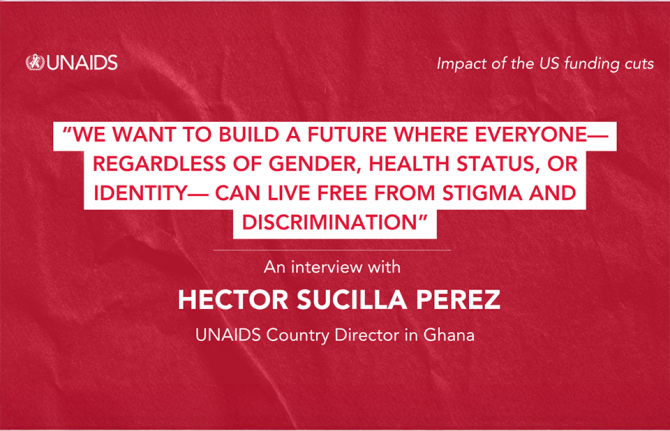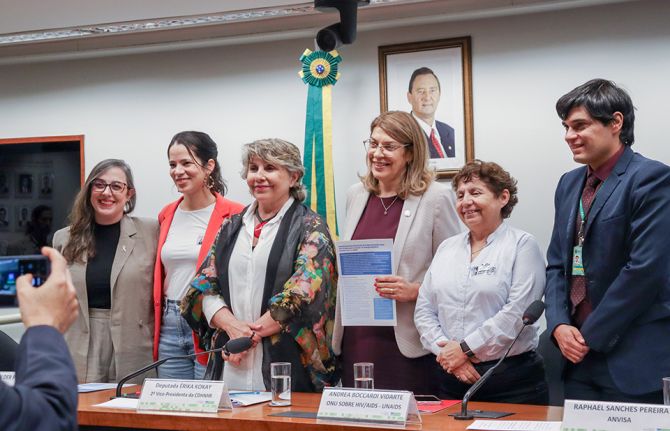
Update
Ensuring that women living with HIV have access to cervical cancer services in Namibia
06 April 2017
06 April 2017 06 April 2017The combination of HIV and cervical cancer is putting women’s lives at risk. The two diseases are inextricably linked, with women living with HIV up to five times more likely to develop cervical cancer.
Both diseases are preventable and can be treated effectively, but only if caught early. HPV infection can be prevented through vaccination. If infection does occur, the direct medical costs of detecting and removing cervical pre-cancer can amount to less than US$ 25 per person. HIV is preventable, but if infection does occur, responds well to treatment, albeit lifelong, which can cost as little as US$ 100 per person per year.
As part of efforts to ensure that women have accurate information about the risk of cervical cancer and HIV and have access to integrated services, President George W. Bush and Ms Bush, the First Lady of Namibia Monica Geingos, the Executive Director of UNAIDS, Michel Sidibé, the Chief of Staff of the Global Fund to Fight AIDS, Tuberculosis and Malaria (Global Fund), Marijke Wijnroks, and Celina Schocken, Chief Executive Officer of Pink Ribbon Red Ribbon, visited the Windhoek Central Hospital in Namibia to find out more about the “screen-and-treat” services it will be starting in the next few months.
The “screen-and-treat” programme will enable medical staff to screen women for precancerous lesions and treat them during the same visit. The programme has been supported by Pink Ribbon Red Ribbon, a partner of UNAIDS that is working to increase access to cervical and breast cancer services in resource-limited settings.
HIV prevalence is estimated at more than 13% in Namibia and in 2015 there were 120 000 women living with the virus. Cervical cancer is the second most common cancer among women after breast cancer in Namibia.
During the visit, representatives of the Global Fund and Pink Ribbon Red Ribbon signed a collaboration agreement, which will see savings from cost efficiencies in HIV programming being used to expand efforts to integrate HPV screening and early treatment in countries where the Global Fund already supports HIV programmes.
Michel Sidibé announced that UNAIDS will also be supporting efforts by providing funding to support networks of women living with HIV in Namibia and ensuring community mobilization, engagement and education so that women living with HIV are referred to and have access to services. Part of the funds will also go to reducing stigma and discrimination around HIV and cervical cancer to ensure that women can access the care and support they need.
Quotes
“Screening and early treatment for cervical cancer saves lives. UNAIDS is committed to ensuring that women living with HIV know the risks and have timely access to the HIV and cancer services they need. This integrated approach is critical for their health and well-being.”
“We expect that this effort will go on to save many lives and build even more livelihoods. By achieving the goals of this partnership, we will stay true to the calling to focus on the needs of a person, a family, a community, not a disease.”
“Pink Ribbon Red Ribbon’s success is rooted in the commitment of governments and the strength of its partnerships. It is through the support of governments in the countries where we work that we are able to have an impact. We are pleased that the Global Fund is reprogramming funding for cervical cancer in Namibia and other countries. This funding will help the countries procure the appropriate resources – in equipment, training and human capital – that is needed to prevent and treat cervical cancer, and to ensure that women lead healthy, productive lives.”
Region/country
Related

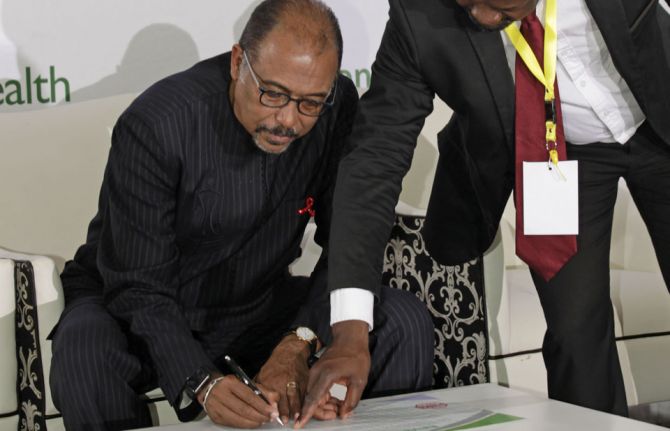
Update
South Africa launches new plan to advance progress towards ending AIDS
03 April 2017
03 April 2017 03 April 2017South Africa has made great strides in its AIDS response—it has the largest HIV treatment programme in the world, with more than 3.3 million people on antiretroviral therapy, funded almost entirely from domestic sources; AIDS-related deaths have declined by more than 55% since 2005; and around 95% of all pregnant women living with HIV in South Africa now have access to medicines to reduce the risk of transmitting HIV to their child.
South Africa is continually striving to do more to stop new HIV infections and prevent AIDS-related deaths and on 31 March launched its third five-year South African National Strategic Plan on HIV, Sexually Transmitted Infections and Tuberculosis (2017–2022). The plan was launched at a special event in Bloemfontein, the judicial capital of South Africa, by Deputy President Cyril Ramaphosa. The Executive Director of UNAIDS, Michel Sidibé, was present at the event to show his support for the new plan.
In the plan are a set of bold and ambitious targets which include reducing new HIV infections from 270 000 to less than 100 000 per year, reducing new tuberculosis (TB) infections from 450 000 to less than 315 000 per year and reaching the 90–90–90 targets—whereby 90% of people living with HIV know their HIV status, 90% of people who know their HIV-positive status are accessing treatment and 90% of people on treatment have suppressed viral loads—by 2020.
To achieve the targets the government and partners will use a combination of high-impact programmes in the locations and among the populations most affected by HIV. The plan also outlines a special focus on HIV prevention among adolescent girls and young women, who have the highest rates of new HIV infections in South Africa—100 000 young women became newly infected in South Africa in 2015.
South Africa is also stepping up its efforts to treat TB. Most AIDS-related deaths in South Africa are due to TB, and in recent years South Africa has experienced a new epidemic of multidrug resistant and extensively-drug resistant TB. As part of plans to dramatically improve adherence and drug resistance issues, the Minister of Health, Aaron Motsoaledi, recently launched a new nine-month drug regimen to treat multidrug resistant TB.
Quotes
“As we launch this third National Strategic Plan, we must remember that in the end it is a plan that belongs to all of us as South Africans. It invites South African leaders from different walks of life to take action to end the epidemics of HIV, tuberculosis and sexually transmitted infections. Defeating the HIV and tuberculosis epidemics is going to rest on all of our shoulders.”
“South Africa is global leader in the AIDS response and has demonstrated that it is possible to go to scale. We can see this in the numbers of people testing for HIV each year, people on HIV treatment and having the right political leadership.”
“We need to ensure that no one is left behind. The national response is about the people. We can’t do this if we don’t involve people. Our actions will count.”
“We need to focus for impact on the districts where the highest HIV burden is. Especially among adolescent girls and young women there are five key things we need to do: keep them HIV-free, keep them in school for longer, eradicate “blessers” through economic empowerment, have zero tolerance for gender-based violence and reduce teenage pregnancies.”
Region/country

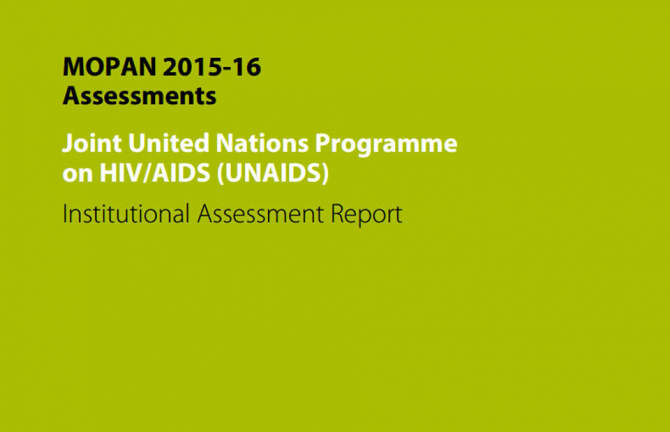
Update
Top donors value UNAIDS’ contribution to change
28 March 2017
28 March 2017 28 March 2017A group of 18 of UNAIDS’ top donors have published a report highlighting UNAIDS’ unique value to the communities it serves and its partners and key stakeholders. The assessment, carried out by the Multilateral Organisation Performance Assessment Network (MOPAN), which was set up to monitor the performance of multilateral development organizations at the country level, found UNAIDS’ use of strategic information, convening power and mutual accountability systems to be among its key strengths.
UNAIDS was assessed on areas that include strategic and operational management and delivering results. The assessment identified a set of core areas in which UNAIDS scored most highly, including achievement of results, organizational and financial framework, relevance to partners and results focus.
“It is reassuring to hear that UNAIDS’ work continues to be highly valued by our partners and donors,” said Michel Sidibé, Executive Director of UNAIDS. “UNAIDS is a unique programme that consistently adapts to the new realities of global health and development, drives change and promotes innovation. We are pleased with this assessment and we will use it to continue to strengthen our impact."
The assessment shows that the UNAIDS Secretariat meets the vast majority of the requirements of an effective multilateral organization and highlights the unique value of UNAIDS as a force for change at this critical point in the AIDS epidemic.
Luxembourg led the assessment process and convened a meeting in Geneva, Switzerland, on 13 March to discuss the report. UNAIDS’ senior leadership, the MOPAN Secretariat and representatives of more than 35 permanent missions attended the meeting.
“A key strength is building up the capacity for local partners, especially community-based organizations and networks to support community-based programmes for the most vulnerable groups,” said a partner interviewed for the MOPAN assessment.
The assessment also provides an opportunity for UNAIDS to build on key areas of work, including improving evaluation systems to better capture results and incorporate learning into developing new innovations.
The report presents a comprehensive, robust, evidence-informed review of UNAIDS’ work in countries and UNAIDS encourages donors to continue to use the tool to assess UNAIDS’ work in the future. The positive assessment will help UNAIDS to continue to improve and build on its unique strengths to provide the most effective support to partners in our joint efforts to end the AIDS epidemic as a public health threat by 2030 as part of the Sustainable Development Goals.
MOPAN members are Australia, Canada, Denmark, Finland, France, Germany, Ireland, Italy, Japan, Luxembourg, the Netherlands, Norway, the Republic of Korea, Spain, Sweden, Switzerland the United Kingdom of Great Britain and Northern Ireland and the United States of America, which represent 94% of UNAIDS’ core funding.
Related

Update
Mobilizing changemakers: francophone city mayors meet on HIV
27 March 2017
27 March 2017 27 March 2017Francophone mayors gathered in Côte d’Ivoire’s capital, Abidjan, on 23 and 24 March to discuss the HIV responses in their cities. Abidjan’s Governor, Robert Beugré Mambe, and the Mayor of Paris, Anne Hidalgo, convened, with the help of UNAIDS, the two-day meeting with 20 mayors, mostly from western and central Africa.
The meeting comes more than two years after mayors from around the world signed the Paris Declaration to end the AIDS epidemic in their cities.
The mayors who signed the Paris Declaration committed to putting cities on the Fast-Track to ending the AIDS epidemic through a set of commitments. Those commitments include achieving the 90–90–90 targets, which will result in 90% of people living with HIV knowing their HIV status, 90% of people who know their HIV-positive status on treatment and 90% of people on treatment with suppressed viral loads. Several cities, including Paris, are already close to reaching 90–90–90.
Niamey (Niger), Nouakchott (Mauritania), Tunis (Tunisia), Antananarivo (Madagascar) and L’Acul (Haiti) signed the Paris Declaration in Abidjan, bringing the total number of signatory cities worldwide to 215.
During the opening ceremony, UNAIDS Executive Director Michel Sidibé congratulated Côte d’Ivoire for being one of the countries with the most cities to have signed the Paris Declaration.
In western and central Africa, three out of four people living with HIV do not have access to treatment. This is a sharp contrast with eastern and southern Africa, where average treatment coverage in 2015 was 54%. UNAIDS and partners have therefore launched a catch-up plan to ensure that 1.8 million people in eight western and central African countries access treatment. The plan, Mr Sidibé said, can only succeed with cities and mayors as focal points throughout the region.
Quotes
“We need to engage with local authorities to transform the global community. This is the basis of the cities initiative and the basis of ending the AIDS epidemic and leaving no one behind.”
“In Côte d’Ivoire, 90 cities signed the Declaration of Paris to end the AIDS epidemic. In the world, more than 200 cities have taken the same step. I commend everyone on this joint effort to put an end to AIDS.”
"We have to act and build partnerships, notably with local authorities, because all of our actions can be applied to cities. The AIDS response calls for coalitions and bridge-building between city administrations, civil society and pharmaceutical firms. This mayor’s meeting is an additional milestone towards an AIDS-free world.”
“The cities initiative has really taken off with the mayors’ involvement. UNAIDS has delivered by bringing key partners together, because by getting everyone on board, we achieve more targeted responses and successes.”
Region/country

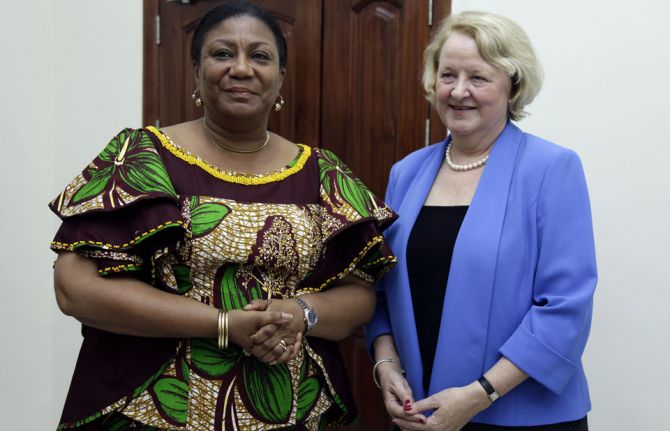
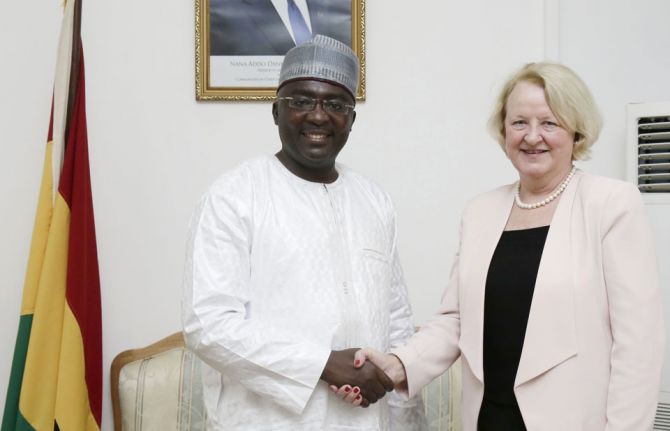

Update
Ghana chairs UNAIDS PCB for 2017 and confirms commitment to ending AIDS by 2030
28 March 2017
28 March 2017 28 March 2017Ghana is the Chair of the UNAIDS Programme Coordinating Board (PCB) for 2017. The Minister of Health, Kwaku Agyeman-Manu, will chair the two PCB meetings in the year, with the President of Ghana, Nana Addo Dankwa Akufo-Addo, addressing the meeting in June.
“As Ghana takes the position as Chair of the Programme Coordinating Board, we will certainly work hard to justify the confidence reposed in us. We are committed to working closely with UNAIDS to achieve our collective goal of making our world AIDS-free by 2030,” said Mr Agyeman-Manu.
UNAIDS Deputy Executive Director Jan Beagle has visited Ghana to discuss the countries’ PCB chairmanship, as well as advances and challenges in the HIV response, with the government and other key stakeholders. Welcoming Ghana’s leadership on the PCB, Ms Beagle said, “As Chair, Ghana brings experience and energy to the Programme Coordinating Board. We are looking forward to Ghana’s leadership to drive forward the implementation of the UNAIDS 2016–2021 Strategy and to help us make the end of AIDS a reality.”
Ms Beagle’s visit to Ghana included discussions with the Vice-President of Ghana, Mahamudu Bawumia, the First Lady of Ghana, Rebecca Akufo-Addo, and the Minister of Foreign Affairs and Regional Integration, Shirley Ayorkor Botchway.
Ms Beagle also met with members of civil society, including people living with HIV, networks of widows, members of the United Nations country team and key development partners in the Ghanaian AIDS response.
Ghana has some 270 000 [230 000–330 000] people living with HIV and has made significant strides in its AIDS response through integrated multisectoral approaches. Results include a reduction of new HIV infections by 57% between 2000 and 2015 and of AIDS-related deaths by 33% in the same period, as well as the almost doubling of HIV testing among women since 2008.
Despite gains, overall HIV testing remains relatively low, in part owing to stigma and discrimination, but as more than 90% of pregnant women attend antenatal care, there are opportunities to increase levels of testing and treating all HIV-positive pregnant women. This could eliminate mother-to-child transmission of HIV (in 2015, some 2200 [1600–2900] babies were born with HIV in Ghana) and contribute to improving treatment coverage, which is currently at 34% [29–41%].
Region/country
Related
 Impact of US funding cuts on HIV programmes in Ghana
Impact of US funding cuts on HIV programmes in Ghana

08 April 2025


Update
Bringing HIV services to hard-to-reach people in Victoria Falls
22 March 2017
22 March 2017 22 March 2017When Desire speaks about his role as a peer educator in Victoria Falls, Zimbabwe, the energy and commitment to his work is unmistakable. Desire works in the North Star Alliance Clinic, which provides health services for hard-to-reach populations, mainly sex workers and truck drivers, while also offering services to the surrounding communities.
Desire is a former barman and sex worker who was born and brought up in Victoria Falls. When he found out from a friend that there was a job opening at the clinic he readily applied. His boundless energy and social skills meant that he was quickly hired and trained to become a peer educator.
North Star Alliance clinics are located in areas with high HIV prevalence. They offer primary health-care services, services for sexually transmitted infections and malaria, HIV counselling and testing and screening for tuberculosis. Through the clinic, essential health services are brought closer to the people who need them most in a comfortable environment without prejudice.
“Owing to stigma and discrimination, most sex workers and men who have sex with men don’t attend public health facilities. Instead, they go to private clinics or nongovernmental organizations for condoms,” Desire explained.
Stepping up HIV prevention efforts in Zimbabwe has had impressive results. In 2015, there were 64 000 new HIV infections, down from 87 000 in 2005 and 220 000 in 1992. However, HIV prevalence among sex workers remains extremely high—at more than 57% in 2015.
“Since I started working as a peer educator I have seen what importance the clinic has in a city like Victoria Falls, where we see a high demand for our services,” Desire explained.
Victoria Falls is a tourist destination, a transit town between Zimbabwe and Zambia and a major truck stop. On average, the clinic sees about 35 female sex workers, 10 to 15 male sex workers and 45 to 50 truck drivers a week.
Desire is most proud of his outreach and community mobilization work, which builds on a strong community empowerment foundation for sex workers and men who have sex with men. “What I want is for everyone to keep themselves healthy,” he said.
Zimbabwe is taking a leading role in efforts to increase HIV prevention across the region. On 23 and 24 March, Zimbabwe will host a regional expert meeting on revitalizing HIV prevention in the eastern and southern Africa region at Victoria Falls. The meeting will seek to set national HIV prevention targets as part of the implementation of the 2016 United Nations Political Declaration on Ending AIDS. UNAIDS Deputy Executive Director Luiz Loures will be among the attendees of the meeting.
“This meeting will be an excellent opportunity for partners from across the region to come together, to develop capacity, to create, replicate and scale-up effective programmes to advance efforts towards ending the AIDS epidemic in eastern and southern Africa,” said Mr Loures.
UNAIDS continues to advocate strongly for the scale-up of HIV prevention and is working with countries to ensure that 90% of people in high HIV prevalence countries, including Zimbabwe, who are at risk of HIV infection are reached by comprehensive HIV prevention services, as outlined in the 2016 United Nations Political Declaration on Ending AIDS.
Region/country

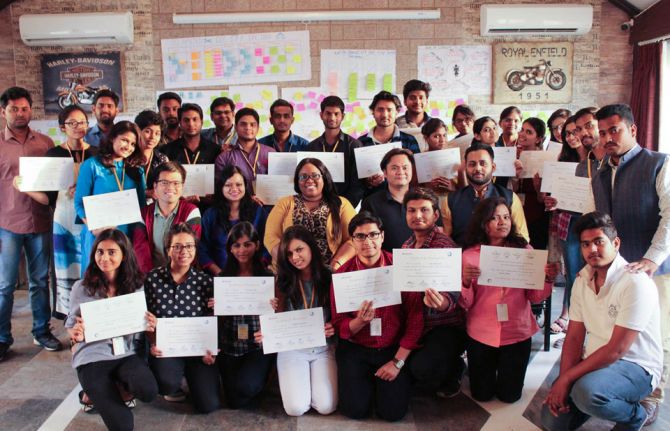
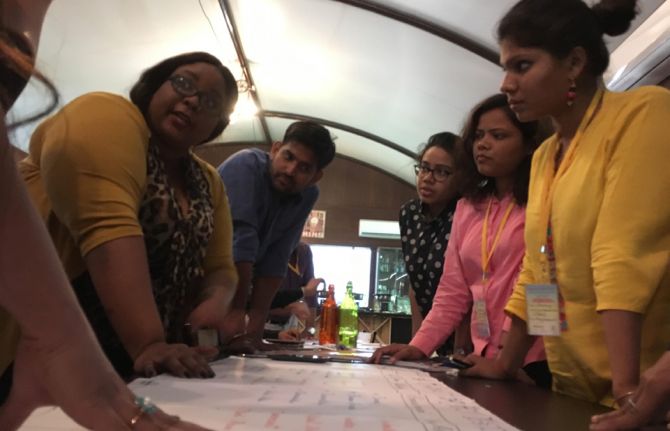

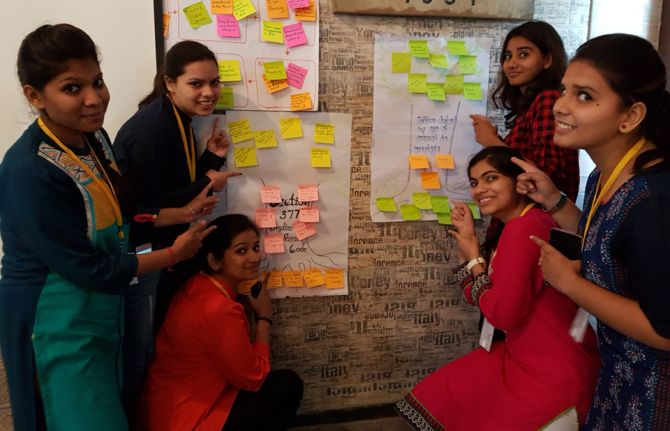
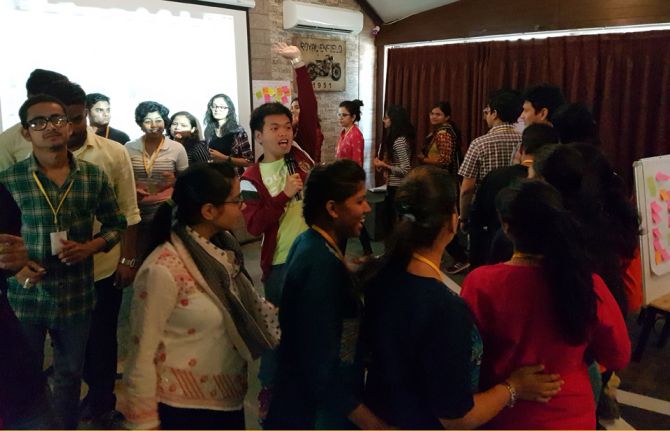
Update
Health workshop educates youth in India
24 March 2017
24 March 2017 24 March 2017Ayushi Tripathi is a student at Banaras Hindu University in Varanasi, a city in India’s northern state of Uttar Pradesh.
She explains that she comes from a family where talking about sex is taboo. “We never talk about it at home. Even seeing an advertisement about condoms is uncomfortable for my parents,” she said. But nonetheless, she was intent on attending a youth health workshop.
This week, she joined 27 other students for a three-day workshop to raise young people’s awareness of their sexual and reproductive health and rights. The training was led by the Dove Foundation, a youth-led organization based in Varanasi and supported by UNAIDS. The advocacy materials used were developed by the PACT, a global coalition of 25 youth networks working on HIV and sexual and reproductive health and rights.
“When I was younger, I didn’t have knowledge on where to get information and access to HIV services,” Ms Tripathi said. “Until I took this workshop, I had no idea that young people in India face challenges in accessing HIV testing and services.”
Monique Long from the Jamaica Youth Advocacy Network led the training, which provided youth and adolescents with the skills and information necessary to tackle the different barriers affecting their health.
“Working with this diverse group of intelligent and energetic young people reminds me of why we say youth are the future. This training also reaffirms that youth right here and right now have the capacity and the will to do amazing things to change the world,” Ms Long said.
Asia and the Pacific is the region with the largest number of young people in the world. In the region, people are starting sex at an increasingly younger age and having multiple sex partners, placing young people at higher risk of HIV.
During the training, the participants stressed how many countries are not tailoring their programmes to young people. For example, India requires people under 18 years old to have parental consent for HIV and other sexual and reproductive health services. Comprehensive sexuality education is often not taught in schools. The low levels of HIV knowledge and discrimination faced in health-care settings further exacerbate the situation.
The PACT and UNAIDS have been working with governments and other partners in advocating for the revision and reform of age of consent laws. The training provided young people with the techniques and skills needed for prioritizing advocacy issues, mapping different stakeholders, crafting key advocacy messages and lobbying.
“UNAIDS knows that the future of the HIV response lies in the hands of young people,” said Aries Valeriano, Youth Officer at the UNAIDS Regional Support Team for Asia and the Pacific. “We are working hand in hand with youth organizations and community groups to break down the barriers that young people face and that keep them from staying healthy and productive.”
After completing the workshop, Ms Tripathi said she plans to start a community of advocates at her university to push for ending the age of consent laws in India. As Ms Tripathi received her completion certificate, she beamed. “The workshop helped to open my eyes on social activism,” she said. “I am so inspired and hope to really influence policies in my university and beyond.”
UNAIDS is working to ensure that the target in the 2016 United Nations Political Declaration on Ending AIDS of ensuring that 90% of young people have the skills, knowledge and capacity to protect themselves from HIV and have access to sexual and reproductive health services by 2020, in order to reduce the number of new HIV infections among adolescent girls and young women to below 100 000 per year, is met.
Region/country

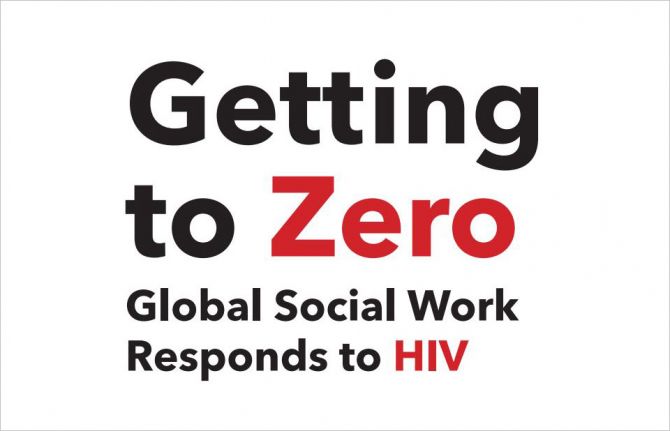
Update
Global social work responds to HIV
21 March 2017
21 March 2017 21 March 2017The International Association of Schools of Social Work (IASSW) and UNAIDS have published a new joint report, Getting to zero: global social work responds to HIV, a collection of stories and articles showing how social workers are central to the AIDS response around the world.
Launched at an event in Geneva, Switzerland, on World Social Work Day 2017 attended by UNAIDS and the President of IASSW, Annamaria Campanini, the report highlights how social workers connect people living with HIV with essential services and make services work for people living with HIV.
The report brings together 18 different contributions on the response to HIV from countries as diverse as Brazil, Ethiopia, the United States of America and Zimbabwe. AIDS is as much a social challenge as a medical challenge, and social workers have been part of the response to HIV since the beginning of the AIDS epidemic. The contributions describe the innovative work of social workers around the world, which can be adapted to other countries and communities towards ending the AIDS epidemic by 2030 as part of the Sustainable Development Goals.
UNAIDS is working to support countries in their efforts to expand community-led HIV service delivery to cover at least 30% of all service delivery by 2030, as set out in the 2016 United Nations Political Declaration on Ending AIDS, which was adopted by the United Nations General Assembly in June 2016.
Quotes
“Social workers worldwide are implementing creative and compassionate responses to HIV. By working with the most vulnerable people, social workers are helping to bring about dignity, solidarity, social justice and hope.”

Update
UNAIDS AWARDED THE 2016 LGBTI CITIZENSHIP ALLIES AWARD IN BRAZIL
21 March 2017
21 March 2017 21 March 2017UNAIDS has received the LGBTI Citizenship Allies Award in recognition of its human rights-based approach to responding to the AIDS epidemic among gay men and other men who have sex with men. Created by Grupo Dignidade (Dignity Group), one of Brazil’s most respected nongovernmental organizations working on issues related to lesbian, gay, bisexual, transgender and intersex (LGBTI) people and on HIV prevention among gay men and other men who have sex with men, the award is given to people and organizations in recognition of their contribution to advancing the rights of LGBTI people in Brazil.
The award highlights some of the efforts made by UNAIDS in this area, including the development of campaigns and initiatives such as the zero discrimination campaign, the production of a wide variety of publications and its advocacy efforts to specifically mention LGBTI people and other key populations in the 2016 United Nations Political Declaration on Ending AIDS.
Georgiana Braga-Orillard, UNAIDS Country Director in Brazil, highlighted the importance of the award. “We are investing time and effort in human rights and zero discrimination in the country and globally. The award shows us that we are going in the right direction and that our efforts are having an impact for the communities we want to support,” she said.
The award ceremony marked the 25th anniversary of Grupo Dignidade. Grupo Dignidade works with partners—including the municipal, state and federal departments of the Public Ministry, public human rights authorities and Brazil’s Supreme Court—on key areas related to human rights and the rights of LGBTI people.
“Much of what I have learned in terms of respect for diversity and the importance of the social movements for the response to the AIDS epidemic came from my constant interaction with Grupo Dignidade,” said Mariângela Simão, UNAIDS Director of Rights, Gender, Prevention and Community Mobilization, in a video message to the award ceremony. “Receiving this award from Grupo Dignidade is very important to us and I would like to thank you, in the name of Michel Sidibé, the UNAIDS Executive Director,” she added.
The ceremony also hosted the Educating on Respect for Sexual Diversity Award, given to 11 selected individual and institutional initiatives that recognized, valued and encouraged the promotion of respect for sexual diversity in the educational environment in Brazil.
UNAIDS is working to support countries to reach the targets set out in the 2016 Political Declaration, which include the review and reform of legislation that may create barriers or reinforce stigma and discrimination, and to promote access to non-discriminatory health-care services, including for populations at higher risk of HIV, specifically sex workers, men who have sex with men, people who inject drugs, transgender people and prisoners.
Partners
Region/country


Update
Supporting efforts to end child marriage in Latin America and the Caribbean
24 March 2017
24 March 2017 24 March 2017Child marriage is widespread across much of Latin America and the Caribbean, accounting for around 23% of marriages in the region, despite laws against it.
The impact of child marriage and early unions (where one of the members is aged below 18 years of age) on girls and their societies can be devastating. Evidence shows that there is a strong link between child marriage and early unions with child pregnancy, maternal and infant mortality, lower education levels for girls and lower ranking on the human development index. And child marriage and early unions make girls more vulnerable to contracting sexually transmitted infections, including HIV.
At a high-level side event co-hosted by the Permanent Missions of Panama and Guatemala to the United Nations in collaboration with UN Women, the United Nations Children’s Fund (UNICEF), the United Nations Population Fund (UNFPA) and UNAIDS, lessons learned and programmatic and policy options to address child marriage in Latin America and the Caribbean were presented.
In the event, which took place on 17 March at the United Nations Headquarters in New York, United States of America, during the sixty-first session of the Commission on the Status of Women, the participants recognized that child marriage and early unions are a violation of human rights and are a grave threat to the lives, health and future development of girls.
The event focused on the importance of supporting legislative reforms to raise the legal age of marriage to 18 and promoting programmes to empower girls and young women.
The event identified successful approaches and strategies for reducing the rates of child marriage. For example, Panama—where an estimated 26% of girls are married before the age of 18 and approximately 7% before the age of 15—has reformed its national legislation on the legal age of marriage. The minimum legal age for marriage in Panama is now 18 years, as is the age of consent. Previously, with parental permission girls aged as young as 14 years and boys aged 16 years could marry. In Guatemala, thanks to advocacy actions led by UN Women, civil society and international cooperation, reforms to the civil and penal codes have been approved to increase the minimum age for marriage to 18 years.
Since 2015, UNAIDS has partnered with UN Women, UNICEF, UNFPA and PAHO/World Health Organization in a joint initiative on eliminating child marriage and early unions that supports government actions to ensure that, throughout their life cycle, the multiple needs of girls and women are recognized and guaranteed.
UNAIDS is working with countries to eliminate gender inequalities and all form of violence and discrimination against women and girls by 2020, as outlined in the 2016 United Nations Political Declaration on Ending AIDS.
Quotes
“Child marriage and early unions are a violation of human rights. Full Stop.”
“Ending child marriage is a moral and legal imperative, and it requires action at many levels. Governments, civil society and other partners must work together to ensure that girls have access to education, health information and services, and empowerment.”
“I recognize efforts conducted by countries like Panama, Guatemala, Ecuador and Mexico to put an end to child marriage. This is as an example to ensure girls’ human rights.”










